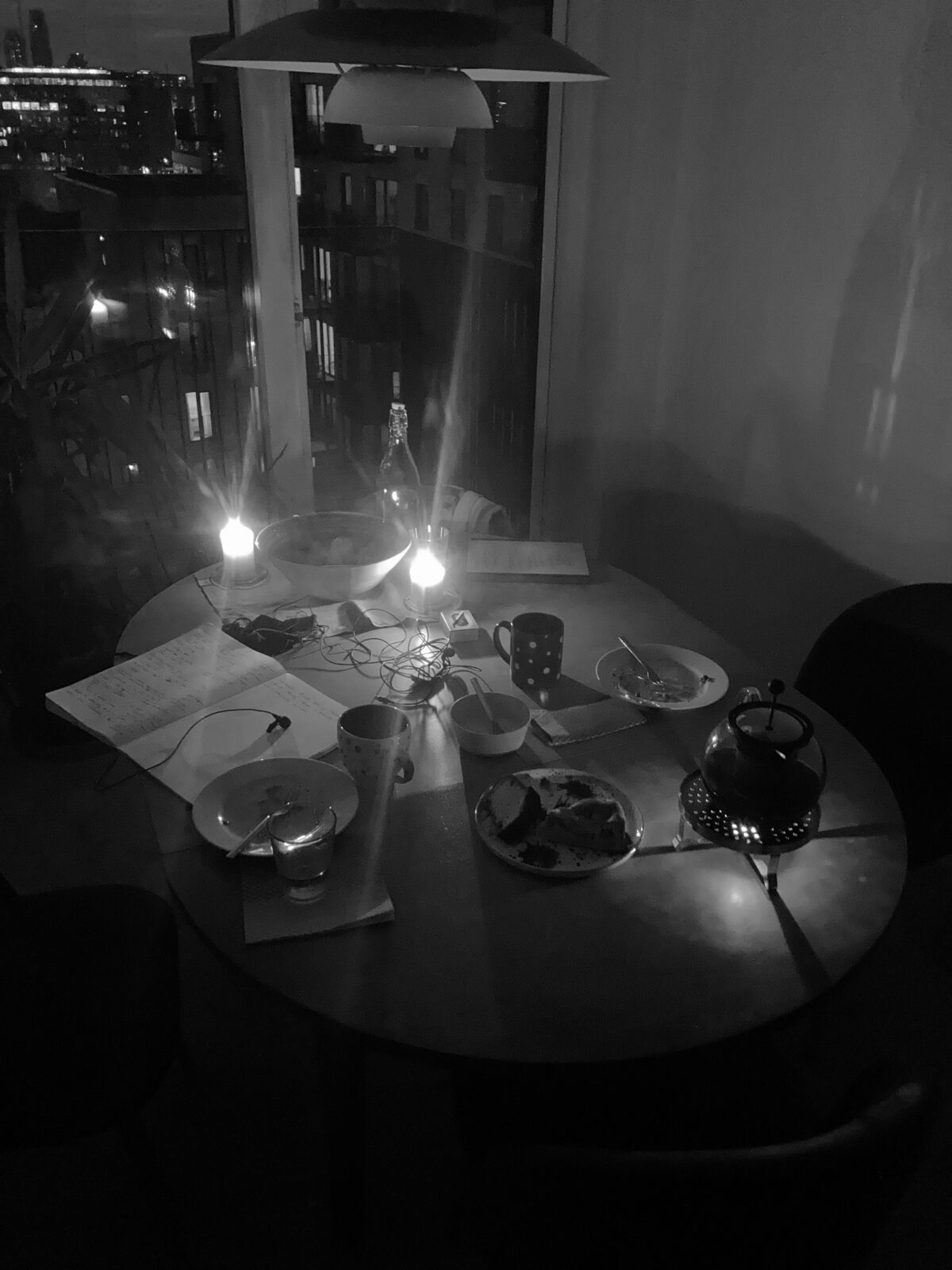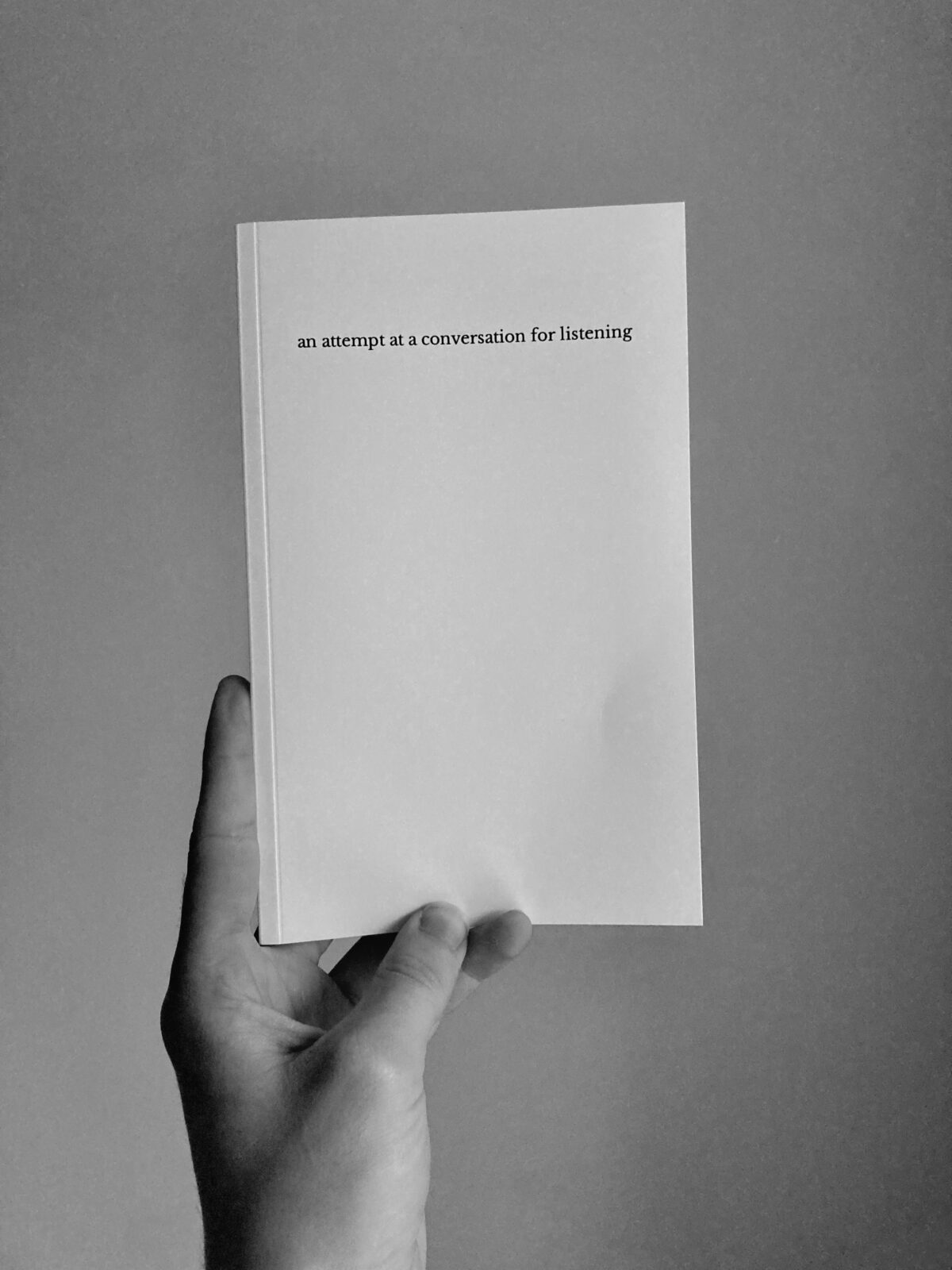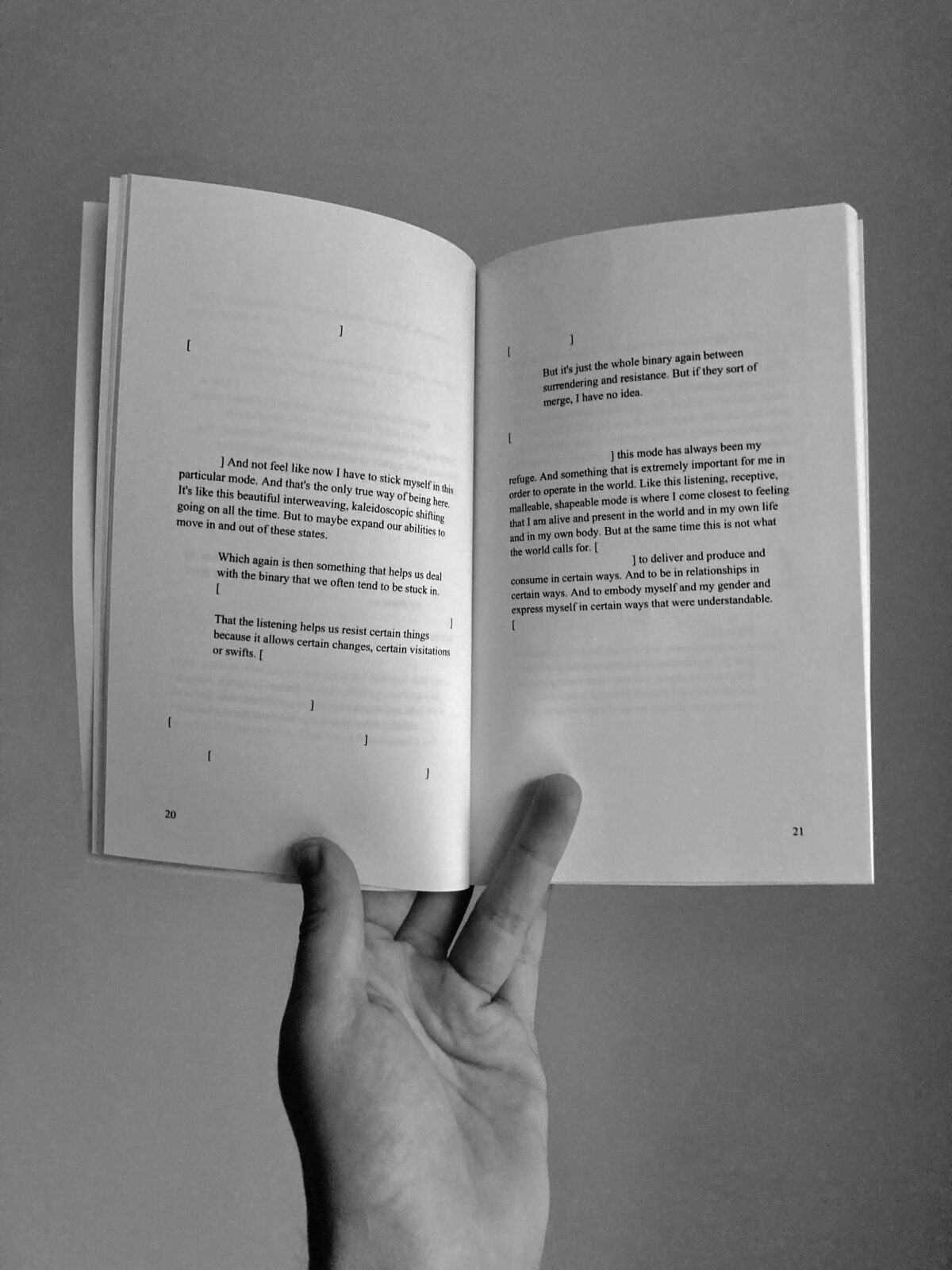Conversations for Listening
Introduction
Conversations for Listening is a long-durational poetic research project investigating different aspects listening through open-ended ‘philosophical’ conversations.
Part of the project has its starting point within our common experience of listening manifesting itself in our ‘good’ conversations. The kind of conversations, where the theme, expected outcome, intentions or whatever that initiated the conversation in the first place is loosened up, changed, forgotten, and the conversation takes on a subject of its own. You are not necessarily able to direct it – the conversation seems directed by other means, and all involved follows, listen to this ‘third’, to what the conversation suggest, seek, wish and dream for. We listen in, offer time and space, while also responding with paths of care and imagination; paths to follow and explore or escape from/within.
Note on strategy
(strategy rather than method)
We attempts to get lost in the same manner, as the philosopher Ludwig Wittgenstein wrote: “a philosophical problem has the form: ‘I don’t know my way about.’ (Philosophical Investigations, 1953, page 123).
We strive to be wondering on and with the subject of listening – to be in touch with something unfathomable and deeply enigmatic while at the same time strangely recognizable and familiar.
In some ways there is a non-strategy, as strategy. The questions and theme are not planned or prepared in depth. It is an open-ended conversation, sensitive to what might appear or grow from the intimate meeting and the deep encounters that a conversation always already is part of. We strive for a philosophical and listening-practicing conversation where we test our assumptions surrounding listening as a phenomena, and dreams about what potentials listening might offer our, and other beings, living.
The conversation is being presented fragmentized poetically, as an attempt to physically open the spaces and paths of the conversations. To allow for imagination and a loss of orientation. The fragmentation does not necessarily reflect the most central arguments, descriptions, etc. You may wonder upon how the fragmentation took place; what choices were made and why they were made? You may wonder, without ever knowing.
“It’s the blanks and gaps,” she says, “that to me actually represent what poetry is – the connections between seemingly unconnected things – as if there is a place and might be a map to thought, when we know there is not.” (Susan Howe, Pierce Arrow, 1999).
‘[…] a single square bracket to give an impression of missing matter.’ (Carson, 2003:xi)
‘Brackets are an aesthetic gesture toward the papyrological event rather than an accurate record of it. […] Brackets are exciting. Even though you are approaching Sappho in translation, that is no reason you should miss the drama of trying to read a papyrus torn in half or riddled with holes or smaller than a postage stamp – brackets imply a free space of imaginal adventure.’ (Anne Carson, If Not, Winter. Fragments of Sappho. London: Virago Press. 2003, pp. xi).
For the conversations for listening, rather than being a gesture comprehending an actual event, the brackets become a gesture generating new events; opening up a space for the reader’s imagination.
For, not on
Bureau for Listening, is for, not of.
So are these conversation for, not on, listening as a phenomena. There is no authority within these conversations. Just a search and an attempt of creating space, meetings and understandings for listening. We seek to wonder upon listening, while listening.
Conversation archive
Meeting and Listening – Randi Lindholm Hansen
Conversation I
Manuscript writer Randi Lindholm Hansen and I didn’t know that listening would be the subject of the conversation. That just happened. We just wanted a short conversation, but that seemed a mistake due to the feeling about listening as a practice that would grow over time. So we agreed to do a follow-up conversation.
This conversation can be considered the beginning for the Bureau for Listening. A first meeting.
Attentionality with Closed Eyes – Tine Bernstorff Aagaard
Conversation II
The conversation with architect and artist Tine Bernstorff Aagaard took place outside a sunny summer day in a public park June 2021, Copenhagen. The conversation was initiated in relation to the TRAVERS program.
For most of the conversation we sat in the grass with our eyes closed.
Listening as Curating – Alexandra Tryanova (to be finalized)
Conversation III
During this conversation Alexandra reflected upon listening in regard to her work as a curator. She also spoke about the concept of listening as a weapon in relation to her experiences with the war in Ukraine.
Expanded Listening – Nana Francisca Schottländer
Conversation IV
This conversation with the performance artist Nana Francisca Schottländer did not really have a time frame. We were laying down on the floor of her studio and slowly exploring experiences and perspectives of and for listening. Carefully we attempted to move away from the binaries of listening to towards an expanded listening understanding and practice.
The Sister, The Unnamed, The Spreading Fire, The Timer and The Waiting Moss – Sisters Hope
Conversation V
Influenced by a research visit to The Sisters Hope Home, and taking place while the performance group members was preparing for a manifestation of Sensuous City Local, this group conversation deals among other deep aspects of time, but also what it means when the most of the conversation recording is ‘lost’.
The conversation with percussionist and composer Ying-Hsueh Chen took place in an early and very warm spring sun. We were part conversing and part listening to the loud sounds from surrounding construction sites.
Notes on breathing, perhaps (Working title) – Miriam Jakob
Conversation VII
Informed by participating in The Listening Academy, Berlin, by The Listening Biennial, this conversation with performance artist and artistic researcher Miriam Jakob explores breathing…
Queering the Radio Voice – Kristoffer Raasted
Conversation VIII
By taking a starting point in artistic researcher Kristoffer Raasted‘s ph.d. project the conversation dwells on the many aspects of connecting queering, listening, researching, and performing.
(1:1 / =) – Jesper Norda
Conversation IX
Following the first ever full durational (12 hours and 25 minutes) performance his of piece The Goldberg Variation (Bach Clock), artist and composer Jesper Norda ‘recovered’ partly by sharing different understandings and practices for listening.
Slow Listening? – Carolyn F. Strauss
Conversation X
This was a (Slow) conversation both curator Carolyn F. Strauss and I had been awaiting for some time. It took place after a Listening Seminar and right before Carolyn went traveling again. It was a conversation taking on many different paths, and while holding on to its premise of Slow Listening.
Listening as life, life as listening, listening as life, life as listening, listening as life, life as.. – Sophia Sagaradze
Conversation XI
Any conversation with composer and sound artist Sophia Sagaradz is despite a disrupted work/life balance a happy and joyful conversation – this affects both the understanding and practicing of listening.
Detailed Reading of the Mountain Side – Morten Søndergaard
Conversation XII
Coming soon.
Listening and Grieving – Hoda Siahtiri
Conversation XIII
The conversation with multidisciplinary artist and researcher Hoda Siahtiri took place a Pappelallee Cemetery, Berlin, in correlation to our participation at The Listening Academy, and followed a workshop/presentation she offered the group.
Listening to the Hands as Aliens – Thiago Granato
Conversation XIV
The conversation with dance artist Thiago Granato took place in the context of a workshop he facilitated during The Listening Academy, Berlin. Conversation both speaks of, with and through our hands. Our hands… in what way are we able to document such an alien companion?
Breathing is a gentle gesture – Marie Koldkjær Højlund
Conversation XV
Being in conversation with sound artist, composer and researcher Marie Koldkjær Højlund is a supportive and explorative experience. With a wide range of possible listening-enteries Marie seems eager to connect and explore these enteries’ potentials and speculative in their awesome consequences.
In Search for Poetry – Budhaditya Chattopadhyay
Conversation XVII
Following concepts such as co-listening and hyper-listening by Budhaditya Chattopadhyay, this conversation went on a quest for poetry – and consequently a possible ‘poetic for listening – how do we write and speak of and for listening?
Maybe a tender encouragement of being together and listening, or to find relationships that can hold shared silence, pauses form speaking and allowing to listen outside of the relationship, might be a good note…[
]
Many other conversations are awaiting transcription and fragmentation (which takes a lot of time…)
Looking forward to present among others conversations with:
Asger Kudahl, Nicole Michalla, Lisa Densem, Marcelo Gabard, Nanna Hauge Kristensen, Jenny Gräf Sheppard….

'Documentation' of a possible site for, or perhaps rather, the traces from a site of a Conversation for Listening.
Other offspring Conversations for Listening
An Attempt at a Conversation for Listening – ??
Vol. I
What would a completely ‘blank’ conversation offer to the series of fragmentized conversations for listening? What kind of imagination would such an ‘absolute’ fragmentation and blankness generate?
This conversation is one attempt at finding out.
An Attempt at an Absolute Blank Conversation – Holger Schulze
Vol. II
On the interest of what an ‘absolute blank conversation’ could be like, prof. Holger Schulze and I (Lukas Quist Lund) met up to explore and lightly test an (attempted) ‘improvised’ conversation. Not necessarily ‘on’ or ‘of’ the subject of an ‘absolute blank conversation’, but rather as a curious conversation; one able to build, formulate, and share some experiences relevant for continuing the experiment.
Notes for a “lost” conversation – Claudia Lomoschitz
How to deal-with the situation of going through a beautiful conversation, for then to discover that only the beginning was actually recorded? Only part 1 of the conversation with artist Claudia Lomoschitz ended up being recorded. However we chose to explore how to deal-with it and consequently care for and reflect on the meaning of a now “lost” conversation”.
—
Other notes for the project
This series of conversations were not originally planned as a series of conversations for listening. Different more individual conversations simply and slowly evolved into it.
Over time these conversations has and will be part of different practice-based research projects. And we seek to find different uses, forms and practicing for them. All the conversation will remain available for free here in the website.
A curated selection of conversations will be published with Errant Bodies Press summer 2024.
—
Fragmentized conversations for listening as poetical empirical data
(questions that has informed this project’s research perspectives)
How can these conversations be relevant as empirical data for a research project investigating listening as a critical and artistic practice?
What potentials and limitations is inherent within the conversational exploration?
In what way does the fragmentation and ‘leaving out’ context create space for the reader’s imagination and wondering? In what way can this fragmentation be understood as a listening practice?
Can we ever ‘know’ the ‘true’ context and ‘truly have access’ to the ‘full’ content of any conversation?
How is not-knowing and not-being-able-to-know a possible poetic for listening?
How can we consider this forced and artificial state of ‘ignorance’ created through this attempted poetically ‘fragmentation’ a chance for the reader to listen?
What does the conversation was practice fail to achieve?
An edition of 50 books titled: an attempt at a conversation for listening, containing the fragmentized transcription of the conversation with performance artist Nana Francisca Schottländer, has been printed and passed around among friends and inserted illegally into libraries (late fall 2023).
If you stumble across of the books, please feel free to keep passing on this conversation to people and places you hold dear.

